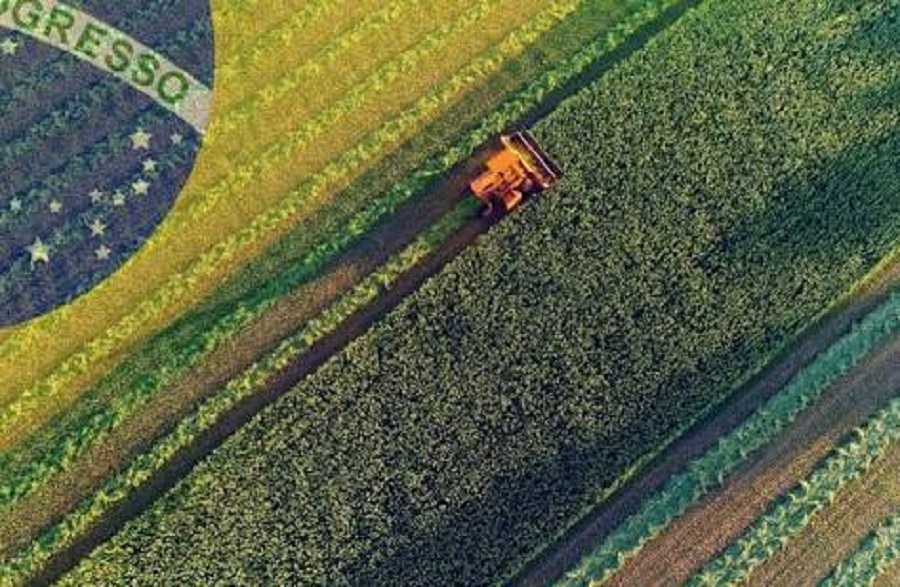RIO DE JANEIRO, BRAZIL – Agribusiness currently accounts for about half of Brazil’s exports. The sector is expanding, with production and revenue generation records in recent years. However, 2021 was below expectations, mainly due to climate issues, and these should continue to have an impact next year.
The sector should also face high production costs, with more expensive inputs, which limits producers’ profit margins. In this case, this increase is linked to external political issues, but also to the devaluation of the Brazilian real.

Nevertheless, experts expect a positive year, underpinned by the forecast of a record harvest in 2022.
Should the weather scenario prove more favorable, agribusiness should maintain its trend to help the Brazilian economy and trade’s positive numbers.
2021 PERFORMANCE
FGV professor and member of FGV Agro Felippe Serigati says it is important to remember that agribusiness is not a uniform activity, and each sector has particular performances, which will not change in 2021.
However, in general, he says that “2021 was not an exceptional year, but it was not that bad either. The balance is positive, just not for everyone.”
He says there was a higher expectation of production at the start of the year than what was accomplished by the sector. The main factor that led to this frustration was the weather, with an intense drought in a good part of the year and frosts in July.
“Several crops had lower yields than expected and below investments made. Corn, coffee and sugar cane were the most affected,” he says.
However, the scenario was not as negative due to the high commodity prices abroad and the devalued Brazilian real, which enabled a positive revenue from exports to the international market. That is, despite the lower volume, prices sustained revenues.
FEA-RP-USP professor Carlos Fava Neves classifies 2021 as “a very good year. We had good quantities of exports, even if the volume dropped in relation to 2020. The values broke records, likely to reach US$119 billion, and income in the field grew 10% in Brazilian reais.”
In his opinion, the main negative point was the drought, which prevented 2021 from being “the best year in the history of agribusiness.” The drop in output caused an increase in food prices in the domestic market.
In the third quarter, agribusiness shrank 8%, the worst performance in years, and led GDP (Gross Domestic Product) to a second consecutive drop in the year.
Another negative highlight for the professor was the increase in illegal deforestation in the Amazon. “This negatively contributes to the image of agriculture, which became associated with deforestation,” he says, which results in sanctions or a loss of consumer market abroad.
While the year, in general, was positive for the livestock sector, Fava Neves says that the performance was damaged by China’s embargo on Brazilian beef, which lasted 3 months and deprived producers of their largest consumer market.
“There was no need for such a long embargo period. The problem should not have lasted so long. It was a negative fact, unnecessary, but the partnership must be maintained, with Brazil supplying meat and grains to the Chinese market and offering good prices to Chinese consumers,” the professor says.
2022 OUTLOOK
According to Serigati, the outlook for 2022 is positive, mainly due to more favorable climate conditions in a large part of Brazil, particularly in the Midwest, a major soy producing area.
Agribusiness production is divided into two harvests. The first, called summer harvest, is planted in late 2021 and harvested in early 2022, and it is expected to have a record yield.
“For the second crop the situation is open. It should be a neutral scenario, but it could change, we can’t be sure,” he says.
However, the positive outlook for production should face a major challenge, namely high production costs. The Brazilian Confederation of Agriculture and Livestock (CNA) is estimating that costs will be the highest in the sector’s history.
Serigati believes that the main factors behind this are external, with a rise in the prices of inputs and fertilizers due to the mismatch between demand and supply worldwide. In parallel, Belarus, a major fertilizer supplier, has been facing political issues with the United States and the European Union, which have imposed sanctions on the country, hindering exports and raising the cost of products.

